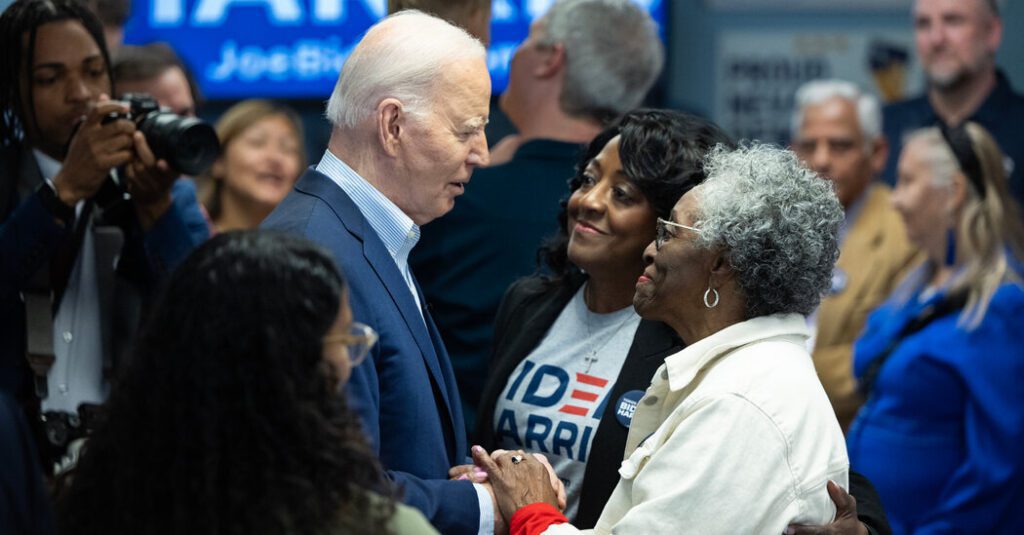President Biden's path to victory depends almost entirely on strong support from women, but his current approval rating among women is the lowest it has been since 2004, a key factor in why the race is so close.
Biden's lead among women has fallen by about 8 percentage points since the 2020 election, down from about 13 percentage points four years ago, according to a New York Times average of more than 30 polls conducted over the past six months.
And since the 2020 election, former President Donald J. Trump's approval rating among men has rebounded, returning to the double-digit lead he held in 2016.
In most presidential elections over the past few decades, Republicans have generally led among men, but in years when Democrats have won the presidency, they have also widened their lead among women.
A new poll of women nationwide and in Arizona and Michigan by KFF, a nonprofit health research organization, found that Biden's drop in support is especially pronounced among black and Hispanic women.
The survey found that abortion and democracy are important issues for a small but significant number of women, while concerns about inflation continue to play a more central role in the campaign, working to Trump's advantage.
But in states where abortion is on the ballot, the KFF poll offers evidence supporting Democrats' theory that the issue will motivate women to turn out to vote.
Biden's support among women remains somewhat stronger than his support among men, which has declined even further, especially among younger men and those without college degrees, and Democratic strategists argue that traditionally Democratic constituencies, including women and Black voters, will swing back to Biden's side as the race progresses.
Still, Biden's current struggles with black and Hispanic women are especially stark. The KFF poll finds Biden leading among black women by 58 percentage points, a significant drop from the 86 percentage point lead he had among black women heading into the 2020 election, according to an average of New York Times/Siena College polls conducted during the 2020 election. Biden's lead among Hispanic women has also shrunk significantly, to about 12 points. The poll found Biden's lead among women overall to be 4 points.
“Once the campaign is in full swing, the abortion issue will rally women together,” said Celinda Lake, a Democratic pollster who has studied women's voting behavior for decades. “Trump wants to get himself in line, but he can't stop bragging about overturning Roe v. Wade.”
The KFF survey found that in states where abortion restrictions exist and may be on the fall ballot, such as Arizona, Democratic women were more willing to vote than in states where abortion access is not at risk. There was no difference in willingness to vote among Republican women.
In Michigan, which voted to affirm abortion rights in 2022, Biden's support among women is slightly lower than in Arizona, said Ashley Kirzinger, deputy director of polling at KFF.
“It's not just that Biden is more popular in Arizona, that's not the case,” Kirzinger said. “Women in Michigan are no longer worried about abortion access, and Biden fare worse in that scenario.”
Abortion-conscious voters tend to be younger, whiter, and more likely to be women overall, according to the KFF poll. They support Biden's handling of the abortion issue and want him re-elected.
But a much larger group of women who say inflation is essential to their vote may decide this election.
“Women are not single-issue people,” said Kellyanne Conway, a Republican pollster, former Trump campaign manager and co-author with Lake of a book detailing women's political aspirations, “so women are not single-issue voters.”
“Joe Biden and the Democratic Party appear to only speak to women from the waist down, because the only issue Joe Biden is leading in the polls is abortion,” Conway added.
Voters who support inflation are more likely to be black and Hispanic than women overall. They are also more likely to be middle-aged. In Michigan, about 60 percent of black women say inflation is the most important issue in their vote. In Arizona, nearly 60 percent of Hispanic women say the same. For these women, inflation is more important than all other issues.
Overall, women were twice as likely to say they have been better off economically under Trump than Biden, according to the KFF poll. Young women, a key constituency Democrats hope to retain this term, were nearly three times more likely to say they have been better off economically under Trump than Biden. Still, 41% of young women said there was no difference in their economic situations between the two candidates. Half of black women also said there was no difference.
.
Democrats' wins with women are a relatively recent trend: In the 1980s, Ronald Reagan and George H.W. Bush won majorities of both men and women. But in the past two decades, Democrats have rarely had less than double-digit leads with women; the last Democrat to finish a campaign with a single-digit lead with women was John Kerry in 2004.

